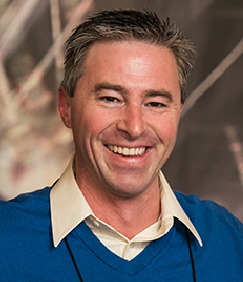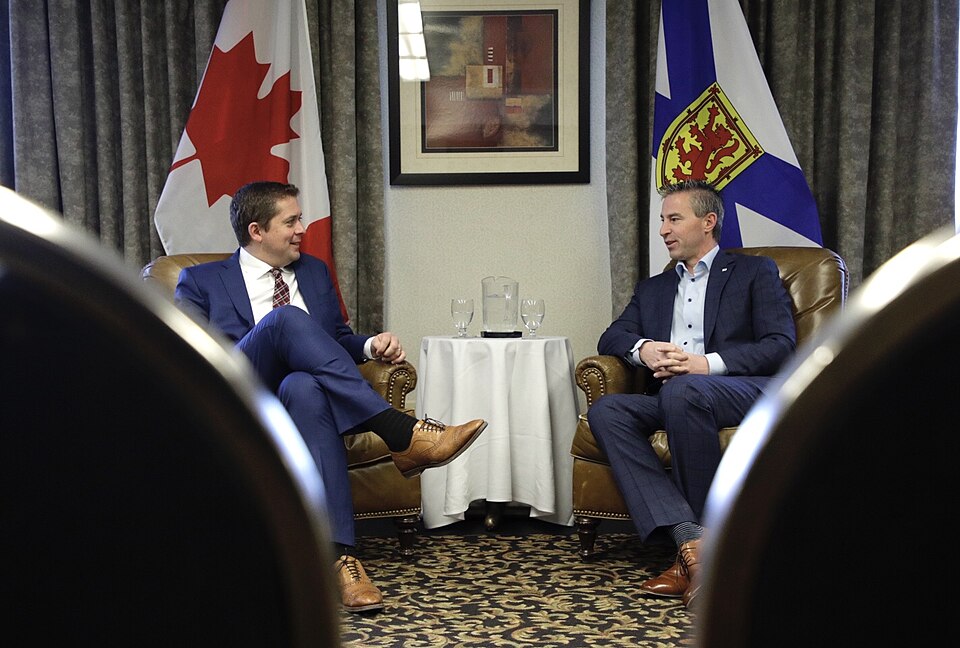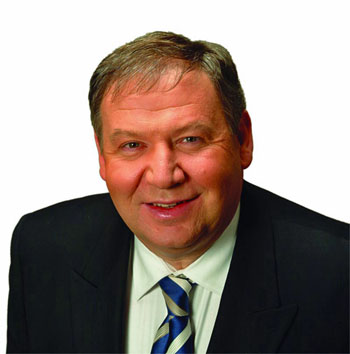Timothy Jerome Houston, accountant, member of the Nova Scotia Legislative Assembly 2013–present, premier of Nova Scotia 2021–present (born 10 April 1970 in Halifax, NS). Tim Houston initially worked in the private sector as a chartered accountant and consultant. He was elected to represent the riding of Pictou East in the Nova Scotia Legislature in 2013. In 2018, he became leader of the PC Party of Nova Scotia and the Official Opposition. Houston and the Progressive Conservatives won a majority government in 2021 and a supermajority in 2024. Known as a pragmatist and a moderate conservative, Houston has often been at odds with the more right-leaning Conservative Party of Canada. In office, he has focused on health care and housing reform and government efficiency. He has also drawn criticism for consolidating power in the premier’s office.

Early Life and Education
Tim Houston was born in Halifax. His father served in the military and brought the family to bases in Prince Edward Island, Ontario and British Columbia. They returned to Nova Scotia by the time Houston started high school. After high school, he completed a Bachelor of Commerce at Saint Mary’s University in 1992. He then became a chartered accountant.
Early Career
In 1995, Tim Houston and his wife, Carol, moved to Bermuda, where Houston worked as an accountant and consultant in the reinsurance industry. (Reinsurance is insurance for insurance companies.) During this time, Houston worked for Deloitte, a London-based consultancy firm. He also worked for a reinsurance company called Inter-Ocean Holdings and various other holdings companies.
In 2017, Houston’s name was identified in the Paradise Papers, a cache of documents from an offshore legal firm. The papers revealed a broad network of tax avoidance and evasion. However, Houston was never linked to any malfeasance.
In 2007, Houston, Carol and their two children returned to Nova Scotia. They settled in Pictou County on the north shore of the province. Houston worked as the CFO of a business called Velsoft, which specializes in online training.

Nova Scotia MLA
In 2012, during the premiership of the NDP’s Darrell Dexter, Tim Houston won the PC Party of Nova Scotia’s nomination for Pictou East. He later said, “There are two reasons people get involved in politics. One is that someone asks you to run, and the other is that you get angry about something. No one asked me!” Houston won that seat in the 2013 election with 48 per cent of the vote, compared to 36.1 per cent for NDP candidate Clarrie MacKinnon.
However, the PCs remained in the Opposition, as Stephen McNeil’s Liberals won majority control of the Legislative Assembly. Houston was re-elected in Pictou East in 2017 in a landslide, with 73.88 per cent of the vote.
Leader of the PC Party of Nova Scotia
On 27 October 2018, Tim Houston was elected leader of the PC Party of Nova Scotia. He finished 54 points shy of the threshold needed to win after the first ballot. But in a show of party unity, the other candidates stood down and threw their support behind Houston. In his acceptance speech, Houston said he “won't stop until Nova Scotia is the leader and the best province in Atlantic Canada and beyond. Change is coming.”
As leader of the Opposition, Houston focused on what he characterized as the McNeil government’s neglect of the health care system and general lack of transparency.
First Term as Premier (2021–24)
Tim Houston’s promises heading into the provincial election on 17 August 2021 reflected his reputation as a pragmatist and a moderate conservative. Amid the COVID-19 pandemic, his pledges to improve and expand key government services appealed to voters. The PCs ultimately gained a majority government, winning 31 of 55 seats. Houston won re-election in his riding with 69.68 per cent of the vote.
When Houston entered office, approximately 71,000 Nova Scotians were wait-listed for a family doctor. One of his flagship promises was to reduce that number by creating an Office of Health Care Professionals Recruitment to attract health care workers to the province. In the first year of its operation, the program did expand the ranks of primary doctors in the province. But the wait-list also continued to swell, due in part to a growing population. By September 2024, more than 160,000 people were on the wait-list. By February 2025, near the beginning of Houston’s second term, it had shrunk to about 104,000 people. But that month, Houston’s administration announced it would stop reporting the number online and would instead include it in monthly news releases.
Relatedly, Houston’s government offered plans to address the problem of understaffing in Nova Scotia’s long-term care facilities. Approximately 86 per cent of these facilities were privately operated. The sector had struggled to retain staff due to long hours and low pay. In 2021, Houston’s administration pledged $22 million to cover the tuition costs of student health care workers.
Another of Houston’s policy innovations was the “Better Paycheque Guarantee.” This policy idea offered to reduce a corporation’s provincial tax bill by 50 per cent if they could demonstrate that they had either passed those savings on to workers or hired more people. The program never got off the ground, however, as the government made new spending commitments on health care and housing. In 2023, Houston suggested that foregoing $200 million in tax revenue might not be feasible.
2024 Election
In October 2024, Tim Houston asked lieutenant-governor Arthur Leblanc to dissolve the Legislative Assembly and set an election for the following month. On 26 November, the PCs went on to a sweeping victory, taking 52.8 per cent of the popular vote and 43 of 55 seats in the legislature. Houston won re-election in Pictou East with his biggest vote share yet: 78.6 per cent.
During the campaign, Houston recommitted to some of his longstanding policy objectives. These included the expansion of health care services and the establishment of a pay-what-you-can lunch program at elementary schools. He also made headlines by not inviting Conservative Party of Canada leader Pierre Poilievre to campaign with him. “There is no federal equivalent to the Nova Scotia PC Party,” Houston told reporters. “I’m the leader of the Nova Scotia Progressive Conservatives. There is a Conservative Party of Canada. It's a completely different party with its own leader.”
Second Term as Premier (2024–Present)
Following the election, Tim Houston rolled out plans for a universally accessible mental health care program focusing on anxiety and mood disorders. However, Houston’s apparent moves to consolidate power in the premier’s office drew criticism. In February 2025, the PC supermajority altered the rules of the legislature, allowing the government to limit debate time. Houston’s government claimed the move would enhance efficiency. Opposition parties expressed concern that it would restrict necessary policy discussions. Houston’s cabinet also revealed a bill that would allow them to fire the auditor general or suppress their reports. But they retracted these plans following public backlash.
Also in February 2025, Houston’s administration introduced legislation that would vastly expand control over post-secondary education by allowing the government to directly appoint up to half the members of universities’ boards of governors. The administration indicated that the policy would guide post-secondary institutions toward training programs that are appropriate for Nova Scotia’s economy. But educators expressed concern that this would come at the expense of programs in the arts and humanities.
During the campaign for the federal election that was called on 23 March and held on 28 April 2025, a long-simmering feud between Houston and the federal Conservative Party boiled over into the open. Days before the election, CBC News reported that Jenni Byrne, the campaign manager for Conservative Party leader Pierre Poilievre, had called Houston shortly after his comments during the 2024 Nova Scotia election. Sources say she told him his party would be cut off from federal support if the Conservatives won the election.
Two days after the election — which saw the Conservatives again finish second, while Poilievre lost his own seat — Houston said, “I think the Conservative Party of Canada was very good at pushing people away, not so good at pulling people in…. I hope they do some soul searching.” The constant friction between Houston and Poilievre — along with the campaign-style ad Houston posted to social media the day before Poilievre’s only campaign stop in Nova Scotia, which Houston did not attend — led some to speculate that Houston may have his eye on the Conservative Party leadership. Houston denied this, repeatedly telling a press conference, “I’m focused on Nova Scotia.” However, he did confirm that he had recently started taking French lessons — typically an indication of an interest in national politics.
(See also Premiers of Nova Scotia; Politics in Nova Scotia.)

 Share on Facebook
Share on Facebook Share on X
Share on X Share by Email
Share by Email Share on Google Classroom
Share on Google Classroom



